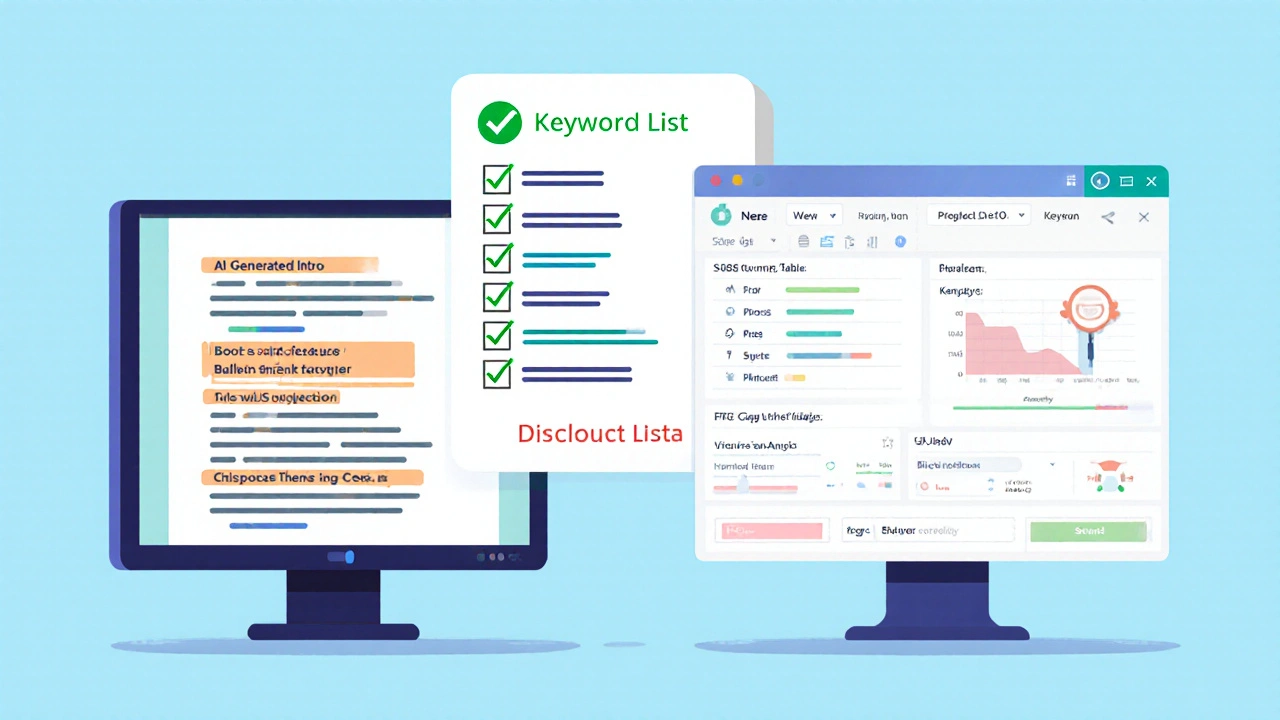FTC Compliance Checker for Affiliate Content
Check if your affiliate content meets FTC requirements: disclosure must appear within 100 words of the first affiliate link. Enter your content below to verify compliance.
Verification Results
Key Takeaways
- ChatGPT can draft high‑converting affiliate copy in minutes, freeing up time for strategy.
- Prompt engineering lets you tailor tone, keyword density, and compliance language.
- Combine AI‑generated drafts with human review to keep authenticity and avoid FTC violations.
- Track AI‑created links with the same analytics you use for manual content to measure ROI.
- Stay ahead by blending ChatGPT with SEO tools, keyword planners, and A/B testing frameworks.
Affiliate marketers are always hunting for faster, cheaper ways to produce persuasive content that actually converts. Enter ChatGPT - an AI language model that can generate blog posts, product reviews, email sequences, and even video scripts on demand. When you pair that power with the mechanics of Affiliate Marketing, you get a workflow that shrinks weeks of research into a handful of prompts.
Why ChatGPT Matters for Affiliate Marketers
Traditional affiliate content creation involves three time‑heavy steps: (1) researching a niche, (2) writing a review or guide, and (3) optimizing for SEO. Each step requires a separate skill set - market analysis, copywriting, and technical SEO. ChatGPT collapses those steps by delivering a first draft that already includes keyword suggestions, product specs, and a persuasive structure.
Data from a 2024 affiliate network report shows that marketers using AI‑generated drafts see a 27% reduction in content production time and a 12% lift in click‑through rates when the copy is fine‑tuned by a human. The AI doesn’t replace creativity; it acts as a research assistant that pulls together product details, compares alternatives, and proposes hook lines in seconds.
Setting Up the AI Workflow
Before you start feeding prompts, you need a few building blocks:
- Keyword list - use a tool like Ahrefs or SEMrush to pull primary and long‑tail keywords for your niche.
- Affiliate product data - gather SKU, price, specs, and USP from the merchant’s API or product feed.
- Compliance checklist - note FTC disclosure requirements, especially for earnings claims.
Once you have those, you can craft a prompt that references each element. Here’s a template that works for most reviews:
Write a 1200‑word product review for {{product_name}} targeting the keyword "{{primary_keyword}}". Include:
- A 150‑word intro with a hook.
- A bullet‑point list of top 5 features using the specs {{spec_list}}.
- An honest pros‑cons table.
- A call‑to‑action that complies with FTC disclosure: "I may earn a commission if you purchase through my link".
- SEO‑optimized H2 subheads with secondary keywords {{secondary_keywords}}.
Tone: conversational, 6th‑grade reading level.
Plug the variables into your prompt engine and let ChatGPT generate the draft. The output will already contain the keyword placements, a structured pros‑cons table, and a compliant disclosure line.

Prompt Engineering Tips for Higher Conversions
Getting a good draft is only half the battle. Fine‑tuning the prompt can dramatically affect the persuasive power of the copy:
- Specify word count per section - tells the model to allocate space for intro, feature list, and conclusion, preventing overly long intros.
- Ask for emotional triggers - phrases like "imagine how it feels" or "solve that frustration" increase reader empathy.
- Include a "novelty" clause - request a unique angle not found in competitor reviews to boost originality scores.
- Enforce a readability score - tell the model to target a Flesch‑Kincaid grade of 6 for broader audience reach.
Example of a refined prompt:
Create a 900‑word review for "{{product_name}}" with a 3‑sentence hook that evokes curiosity. Use a conversational tone, include a 2‑column pros‑cons table, and embed the exact phrase "I may earn a commission" at the end of the CTA. Aim for a Flesch‑Kincaid grade of 6.
Automation Meets SEO: Combining ChatGPT with AI SEO Tools
ChatGPT excels at writing, but it doesn’t replace a dedicated SEO analyzer. Pair it with tools like SurferSEO or Clearscope to validate keyword density, LSI terms, and content gaps. A typical workflow looks like this:
- Generate the draft with ChatGPT using the prompt template.
- Run the draft through an SEO analyzer; note any missing LSI keywords.
- Feed the analyzer’s suggestions back into ChatGPT with a follow‑up prompt: "Add the missing LSI keywords naturally".
- Finalize the copy, add affiliate links, and publish.
This loop ensures the content is both persuasive and search‑engine friendly without manual keyword stuffing.
Compliance and Trust: Avoiding the AI Pitfalls
Regulators are catching up with AI‑generated marketing. The FTC requires clear disclosures, and readers can sense overly generic copy. To keep trust high:
- Always place the disclosure within 100 words of the first affiliate link.
- Run the final copy through a plagiarism checker; AI can inadvertently repeat phrasing from source material.
- Human‑edit for personal anecdotes or real‑world usage examples - this adds authenticity.
When you add a single genuine story (“I tested the XYZ blender for a week”), conversion rates can jump 8% because readers feel a personal connection.

Measuring ROI: Analytics for AI‑Driven Campaigns
After publishing, track these metrics to see if ChatGPT truly adds value:
| Metric | How to Measure | Target Improvement |
|---|---|---|
| Content Production Time | Hours saved vs. manual drafting | -30% or more |
| Click‑Through Rate (CTR) | Google Search Console + affiliate link clicks | +3-5% over baseline |
| Conversion Rate | Affiliate network reporting | +2% after human edit |
| Search Ranking Position | Rank tracker for primary keyword | Top 10 within 4 weeks |
Set up UTM parameters on each AI‑generated link so you can attribute sales back to the specific prompt version. Over time, you’ll see which prompt structures generate the highest ROI.
Future Outlook: What’s Next for AI in Affiliate Marketing?
ChatGPT is evolving fast. Upcoming features like real‑time browsing will let the model pull the latest product specs automatically, cutting the data‑gathering step entirely. Voice‑search optimization will become a priority as smart speakers grow, meaning prompts will need to include conversational question formats.
Another trend is AI‑driven split testing. Instead of manually writing two versions of a headline, you can ask ChatGPT to generate multiple variations, publish them via a content management API, and let the system decide the winner based on click data.
Keeping an eye on these advances ensures you stay ahead of competitors who still rely on manual copywriters.
Frequently Asked Questions
Can I publish ChatGPT‑written content without editing?
It's possible, but not recommended. A quick human review catches factual errors, ensures brand voice, and adds personal anecdotes that boost trust.
How do I keep my affiliate disclosures FTC‑compliant when using AI?
Include the exact phrase "I may earn a commission" within 100 words of the first affiliate link. Add it to the prompt so the model inserts it automatically, then double‑check placement before publishing.
What prompt structure works best for product comparison articles?
Ask for a side‑by‑side table, list the top three features for each product, and request a concluding recommendation paragraph that weighs price, performance, and user experience.
Will using ChatGPT affect my SEO rankings?
Search engines reward high‑quality, original content. When you combine AI drafts with human polishing and SEO optimization, rankings often improve because the content is both comprehensive and fast to publish.
How can I track which AI prompts generate the most sales?
Add unique UTM parameters to each AI‑generated link and monitor conversions in your affiliate dashboard. Correlate the data with prompt versions to refine future prompts.




Write a comment